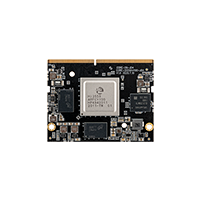软件调试¶
海思提供了一系列调试工具,方便用户调试各个模块功能质量,甚至是硬件通信等。
工具目录¶
底层通讯协议和寄存器读写工具:
./Hi3559AV100_SDK/osdrv/tools/board/reg-tools-1.0.0/bin //SDK 中
├── btools
├── hiddrs -> btools //测试 DDR
├── himd -> btools //读寄存器
├── himd.l -> btools
├── himm -> btools //写寄存器
├── i2c_read -> btools //调试 I2C
├── i2c_write -> btools
├── ssp_read -> btools //调试 SPI
└── ssp_write -> btools
MPP 平台测试工具源码:
./Hi3559AV100_SDK/mpp/tools //SDK 中
├── ai_dump
├── ai_dump.c
├── avs_chn_dump
├── avs_src_dump
├── fisheye_calibrate
├── mipitx_read
├── mipitx_write
├── vi_bayerdump
├── vi_chn_dump
├── vi_fisheye_attr
├── vi_pipe_yuvdump
├── vo_chn_dump
├── vo_screen_dump
├── vo_wbc_dump
├── vpss_chn_dump
├── vpss_src_dump
# 这里的工具都是用于捕获各个模块通道传输的数据,只用于测试调试
PC 主机调试工具:
./Tools //工具包中
├── AQTools
├── AVS_AutoFineTuning
├── AVS_Calibration
├── Casigntool
├── DEC_LIB
├── HiPro-usb
├── HiTool
├── PQTools
└── usb_tools
# 这里的工具文档已经有很详细的介绍,具体请参考对应文档
读写寄存器¶
查看芯片手册,或者引脚复用列表,查看自己需要修改的寄存器基地址和地址偏移
./himd.l 0xXXXXXXXX(寄存器地址) 4(读数据长度)
./himm 0xXXXXXXXX(寄存器地址) 0xXXXXXXXX(写数据)
以修改 GPIO3_1 复用为 I2C0_SDA 为例: 1.查看引脚复用列表,./Hi3559AV100/ReleaseDoc/zh/00.hardware/chip/Hi3559AV100_PINOUT_CN.xlsx

2.查看到对应寄存器地址为 0x1f00006c, 读寄存器 ./himd.l 0x1f00006c,读出为 0x00001400 3.修改为 I2C0_SDA ,./himm 0x1f00006c 0x0001403
读写 I2C¶
usage: i2c_read <i2c_num> <dev_addr> <reg_addr> <reg_addr_end><reg_width> <data_width> <reg_step>. sample:
0x1 0x56 0x0 0x10 2 2.
0x1 0x56 0x0 0x10 2 2 2.
0x1 0x56 0x0 0x10. default reg_width, data_width, reg_step is 1.
usage: i2c_write <i2c_num> <dev_addr> <reg_addr> <value> <reg_width> <data_width>. sample:
0x1 0x56 0x0 0x28 2 2.
0x1 0x56 0x0 0x28. default reg_width and data_width is 1.
根据原理图、dts 查找设备对应的 I2C 总线(i2c_num)
根据芯片手册、dts 查找设备的 I2C 地址(dev_addr)
根据芯片手册查找需要读写的 I2C 寄存器地址(reg_addr)
根据命令格式进行读写
读写 SPI¶
Usage: ssp_read <spi_num> <csn> <dev_addr> <reg_addr> [num_reg] [dev_width] [reg_width] [data_width] [reg_order] [data_order] .
num_reg and dev_width and reg_width and data_width and reg_order and data_order can be omitted, the default is 0x1.
eg:
ssp_read 0x0 0x0 0x2 0x0 0x10 0x1 0x1 0x1 0x1 0x1.
ssp_read 0x0 0x0 0x2 0x0. default num_reg and dev_width and reg_width and data_width and reg_order and data_order is 0x1.
Usage: ssp_write <spi_num> <csn> <dev_addr> <reg_addr> <data> [dev_width] [reg_width] [data_width] [reg_order] [data_order].
dev_width and reg_width and data_width and reg_order and data_order can be omitted, the default is 0x1.
eg:
ssp_write 0x0 0x0 0x2 0x0 0x65 0x1 0x1 0x1 0x1 0x1.
ssp_write 0x0 0x0 0x2 0x0 0x65. default dev_width and reg_width and data_width and reg_order and data_orderis 0x1.
根据原理图、dts 确认设备的 SPI 总线(spi_num)
根据原理图确认设备连接的篇选信号(csn)
根据芯片手册确认设备地址(dev_addr)
根据芯片手册确认需要读写的 SPI 寄存器地址(reg_addr)
根据命令格式进行读写
PS:
MPP 工具本身就是调用 MPI 接口实现,并且源码中有详细的 Usage 介绍,具体请参考对应文档和源码。
PC 调试工具请参考 《文档介绍》一节,在 ReleaseDoc 中每一个工具都有独立详细的介绍。
